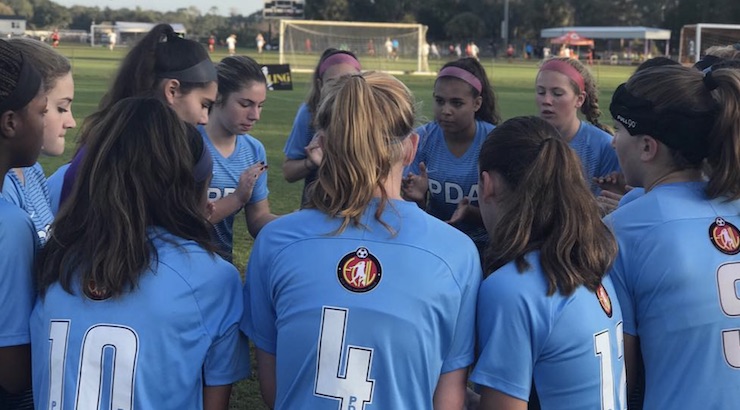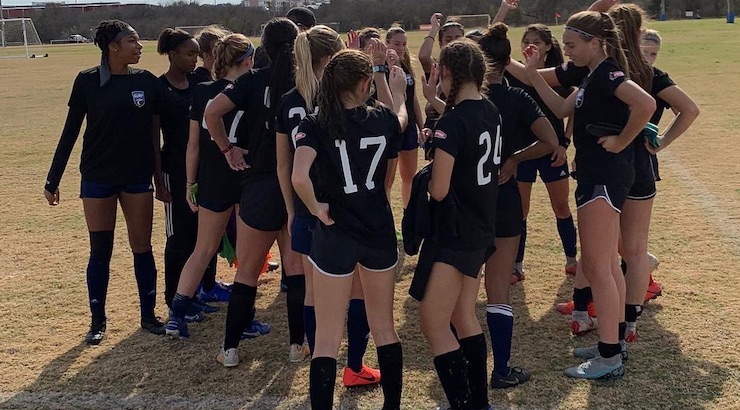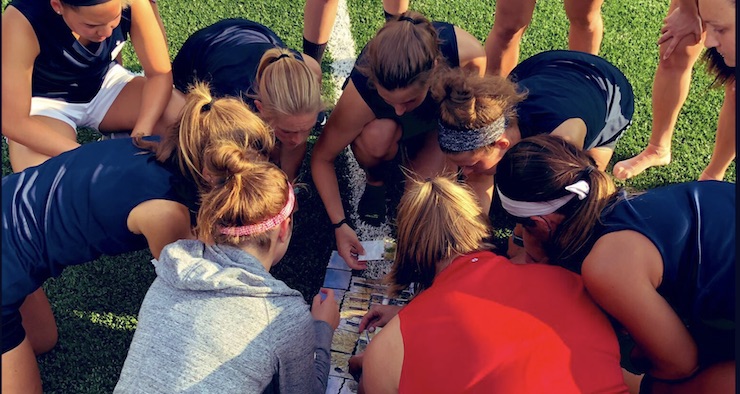Helping Youth Soccer Players Overcome The Fear of Tryouts
This important article is written by SoccerToday’s columnist Bryan Price, a performance and mindset coach who founded Top Mental Game. ‘Mindset matters. Condition your mind like you condition your body.‘
SoccerToday Readers can take advantage of a special discount at Top Mental Game for their online courses with the coupon code: SOCCERTODAY
The girl and her father pulled up to the soccer field next to my wife’s car.
It was a tryout for an ECNL-affiliated soccer club for 11- and 12-year-old girls. One by one, ponytailed players with oversized soccer bags excitedly ran from their cars and onto the field to stretch and warm up.
All except for the girl in the car next to us.
She never got out. She was in tears as the father implored her to join the tryout. At one point, he even got out of the car to further encourage her, but it was futile.
Read: MAKING THESE DAYS COUNT: SOCCER STAR JULIE FOUDY ON WHY MENTAL SKILLS COUNT

She never budged. And after about 20 minutes, they left.
While I don’t know the girl or the reason she remained in the car, this story breaks my heart.
I feel bad for the father because, as parents, we want our kids to attack life with all the confidence in the world, consequences be damned. And as much as we want to protect our kids, I think we’d all rather see them try and fail than never make an attempt.
I feel bad for the player because I, too, have been in her shoes, so afraid of failing that you’d choose to not participate in something you truly love rather than endure the public embarrassment of trying and not making the team.

As a professor who runs a leadership institute at Seton Hall University, an executive leadership coach who works with CEOs, and a mental performance coach who works with athletes, I know all too well that elements of that scared little girl are in all of us.
And I mean all of us.
That fear of failure is what stops a great coach from applying to their dream job even though they have all the prerequisite qualifications.
That fear of failure is what stops the parent from starting that side business they’ve always talked about.
Read: BRYAN PRICE ON TEACHING THE MENTAL SIDE OF SOCCER: VISUALIZATION
And it’s that fear of failure that stops a little girl from getting out of a car to play a sport that she presumably loves.

Left unchecked, this fear of failure can become overwhelming, and the coping mechanism of opting out can become a habit. Over time, that habit can lead to a life of playing small, hesitant and scared. We don’t live up to our potential when that happens. Instead, we always prefer to play it safe.
That’s why they call it the comfort zone.
So, to that little girl out there, and all the others who have experienced similar feelings, here’s my unsolicited advice on how to overcome that fear of failure and live your best life.

1. Youth Soccer Players: Know your “Why.”
Players, why do you play soccer? Parents, ask your child (preferably when they’re not stressed out), why do they enjoy playing soccer? Is it because they love playing with friends? Is it because they enjoy the exercise? Is it to play at the next level? Do they like to compete and test themselves against great competition?
Whatever the reason or reasons, remember that “why” (or remind your child) when you are about to attend a tryout.
Knowing your “why” can help you put things into better perspective and allow you to win the day even if you don’t perform the way you’d want. For example, if you play soccer for the exercise and the opportunity to play with your friends, then you should look at a tryout as just that—an opportunity to get exercise and play with your friends. Don’t make it more than it is.
You’ll find that keeping your “why” at the forefront will not only prevent overreacting to the tryout, but you’ll also likely play better because you’ll be relaxed and not over-thinking.
Read: HELPING YOUTH SOCCER PLAYERS BUILD CONFIDENCE AFTER COVID
Parents, put your emphasis on the bravery it took for your son or daughter to show up, and on your child’s effort, not on how your child played or whether they made the cut or not. If your child is despondent over not making it, gently remind them of their “why.”

2. Youth Soccer Players: Go from a “Fixed” to a “Growth” mindset, and think “Not Yet.”
In her landmark book, Mindset, Carol Dweck explains why some individuals persevere through failure, tough times and hard tasks, while others do not.
She found that individuals who see talent as “fixed” and pre-determined are more likely to quit earlier than those who do not. Those with fixed mindsets are unlikely to seek out challenges. They’re afraid of critical feedback, and they view the success of others as a threat to their own success.
Those with “growth” mindsets embrace challenges. When they do experience a setback, they see it as a necessary stepping stone on the path to success. They seek out and learn from criticism and find inspiration in the success of others.
It’s normal to have fixed mindsets about certain things. For example, I have a fixed mindset about learning languages. But as long as you have a fixed mindset about something that you care about or want to pursue, your potential in that endeavor will be forever limited.

A useful trait that Dweck saw in people with growth mindsets was a “not yet” mentality. Take, for example, the soccer tryout where a player doesn’t make the cut.
Instead of viewing that setback as a terminal failure, a player with a growth mindset would view it as a sign she’s “not yet” ready to play at that level. In other words, she thinks she’ll eventually make it if she continues to put in the time and effort, just “not yet.”
Read: IN SOCCER, CONTROL THE CONTROLLABLES
A “not yet” mentality leaves the door open for improvement and provides a reason to put in the work, and it prevents us from seeing failure as terminal and the final chapter.
So the next time you’re trying to process a setback, tell yourself “not yet.” The next time you hear yourself say, “I’ve always stunk at soccer [or math, or dancing, or languages],” stop and replace it with, “I currently struggle with soccer, but with time, effort and hard work I will get better.”

3. Youth Soccer Players: Decouple your Performance from your Self-Esteem.
This is easier said than done, but this separation is imperative if you want to maximize your potential. This is true for sports, and it’s also true for life.
Whenever I hear a young athlete say, “I’m [X], the soccer player,” that’s a red flag for me. This is because your sport should not be the source of your identity. Not only will you stop playing one day, thus removing the source of your identity, but coupling your performance and your self-esteem is a recipe for burnout, and leads you to feel horrible about yourself when you play poorly.
Instead, I have my athletes say “I’m [X], the great kid, great sister, great friend, who also happens to play soccer.” This doesn’t stop you from investing all of your heart and soul into being the best soccer player you can be, but it helps separate your performance from your identity.

4. Youth Soccer Players: Find a Way to Get Present.
When experiencing pressure or anxiety before a tryout or other stressful situations, it’s usually because we’re too focused on the past or the future.
Either we are looking backward, thinking of all the previous times we’ve screwed up and failed, or we are obsessing over the future consequences and what will happen if we fail to perform. What will my friends say if I don’t make it? Will my parents be upset with me? Will this mean I won’t play in college?
Neither of these scenarios will help you play at your best in the moment. Playing at our best means being present.
When Lionel Messi or Julie Ertz gets interviewed after another epic performance, what do they say when the interviewer asks them what they were thinking during the game? The answer almost always is “nothing.” Or “I wasn’t thinking—I was just playing.”
What you never hear them say is, “Well, Bob, I was non-stop thinking about how I lost the big game when I was in high school.” Or “I was just thinking about what my haters would say on social media if I missed the PK.”
That’s because when we’re present, we are immersed in the moment. We’re focused on the task at hand. We’re giving all of our focus and energy to the here and now. Soccer is too difficult a sport to do otherwise.
I use multiple methods with athletes to get them present (everybody is different). Some think of something completely unrelated to their sport like a favorite song. Others have a trigger word or phrase. Some use a particular focal point—say the upper right corner of the goal—to get them back to the present.
Whatever technique you choose, make sure you include some deep, mindful breathing. It’s a proven method to get you out of your head and back to the present moment.

5. Youth Soccer Players: A Final Word — Butterflies are not a Bad Thing.
Finally, don’t forget that it’s normal to feel anxious for tryouts and other situations that involve pressure or stress.
In fact, it’s a sign that you care.
Before a big game, U.S. soccer legend Julie Foudy told me she went to her mental performance coach and told her she wanted to get rid of her butterflies.
The coach stopped her and said, “You don’t want to get rid of your butterflies. It means you care. You just need to get your butterflies to fly in formation.”

SoccerToday Readers can take advantage of a social discount at Top Mental Game with the Coupon Code: SOCCERTODAY





